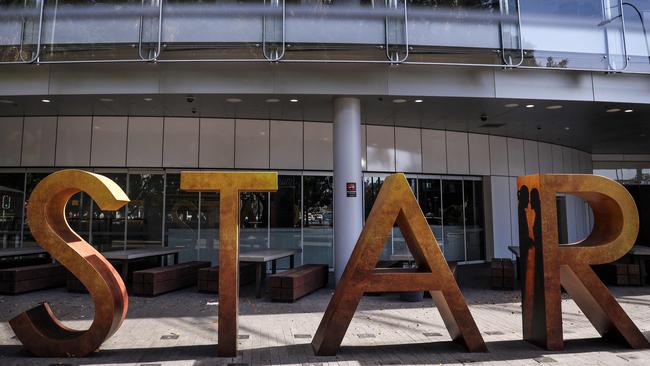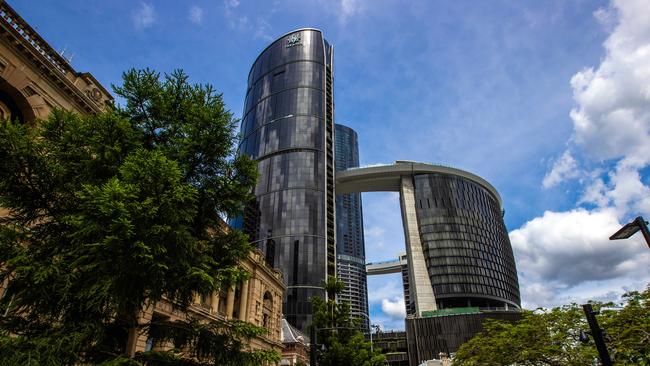Star mulls Queens Wharf buyout offer as ASIC court case against former executives begins
Executives at Star Entertainment were “incurious and complacent” about money laundering risks including bags of cash secretly delivered to a private gaming salon, a court has been told.

Former Star Entertainment executives were “incurious and complacent” about alleged criminal activity and money laundering involving junket operators at the company’s casinos, including bags of $50 notes delivered secretly to a private gaming salon, the Federal Court has heard.
Dr Ruth Higgins, counsel for the Australian Securities & Investments Commission, told the court on Monday that sharp practices became entrenched in the Star’s culture, with significant funding decisions taken that were “blind to questions of probity.”
Dr Higgins said in one incident in 2017 the Star board approved increasing a credit facility for junket operator Qin Sixin by more than $20m despite his arrest five years earlier in China and Macau for involvement in alleged money laundering and illegal banking.

The allegations come as the troubled casino operator revealed it was mulling the sale of the debt-laden Queen’s Wharf precinct in Brisbane to stave off financial collapse.
Dr Higgins opened a six-week hearing that will detail allegations that 10 former executives and directors of Star breached money-laundering controls and corporate fiduciary duties in the period between 2016 and 2022.
“This is a case about casinos and risk,” Dr Higgins told the court.
“Not the risk involved when a player bets black instead of red in roulette or twists instead of sticking in blackjack.
“It is a case about the unacceptable legal, regulatory, financial and reputational risks which the officers and directors of Star allowed to germinate and surface within the group between November 2016 and March 2022.”
Star is now being run by a new board and executive team.
The court heard former Star executives cultivated and maintained business relationships with overseas junket operators, including Macau-based Suncity, despite having substantial evidence they were allegedly engaged in money laundering and had links too rganised crime.
A junket refers to a short-term gambling trip to a casino arranged by a third party junket operator for one or more high-wealth players. Junket operators typically earn a commission on the amount gambled.
“The junket-related conduct that occurred, and was known within Star to have occurred, was particularly brazen,” she said.
“There were reports within Star that in Suncity’s dedicated space at Star Sydney, known as Salon 95, bags of $50 notes were tied together with elastic bands.
“That money was delivered to the service desk in a blue Esky bag, and operators obscured the view of the CCTV cameras by shrouding their activities under a blanket.”
Dr Higgins told the court that former CEO Matt Bekier, company secretary Paula Martin and chief casino officer Greg Hawkins all failed to inform the board of the possible criminal activity involving junkets.
“Geopolitically, during the relevant period, there was a prohibition on gambling in some of the largest markets for junket participants, including China,” Dr Higgins said. “That resulted in vast sums of Chinese money coming into Australia, accompanied in turn by a recognised risk of affiliations to Chinese organised crime, including triad gangs. Relationships with junket operators unambiguously called for heightened care.”

Star’s involvement in junkets had accelerated after the arrest of Crown employees in China on 2017 on suspicion of gambling-related crimes.
She said despite the fact executives did not provide the board with all of the information about Suncity and other junkets, the board could not avoid responsibility for the failure to manage the risks. “Each of Star’s directors failed to take reasonable steps to place themselves in a position to guide and monitor the company’s management and oversee the relationship with junket operators,” Dr Higgins said.

Other defendants in the case include former Star chairs John O’Neill and Benjamin Heap as well as former high-profile directors Sally-Anne Pitkin, Kathleen Lahey, Gerard Bradley, Wallace Sheppard and Zlatko Todorcevski.
As more money flowed from China to Australian casinos, Star executives had allowed NAB customers, who had China Union Pay (CUP) cards, to use those cards to obtain very large sums of money for the prohibited purposes of gambling.
“Since at least 2016, CUP had repeatedly told Star through NAB that it considered that the use of its cards for gambling purposes was prohibited,” Dr Higgins said. “Nonetheless, use of CUP cards for that purpose continued at Star’s casinos. Further, in November 2019, Ms Martin reviewed and permitted correspondence to be sent to NAB and then sent on to CUP, which inaccurately and misleadingly conveyed that CUP cards were only being used by Star customers to pay for non-gambling accommodation expenses.”
Dr Higgins said Ms Martin did not inform the board of the issues that arose in relation to the CUP cards and her conduct exposed Star to harm, including potential legal liability and significant reputational harm.
The court heard that when Mr Bekier was informed that CUP had issued a warning to NAB in relation to the use of its cards at Star properties and that Star would be terminating that practice, he failed to make the appropriate inquiries about what had been communicated previously to NAB and CUP.
The allegations comes as Star Entertainment confirmed it is looking to offload its stake in the debt-laden Queen’s Wharf casino precinct in Brisbane to its Hong Kong-based partners as it seeks to avoid a financial collapse.
The Star confirmed in an ASX release this morning that it had “received several confidential, indicative and non-binding proposals” from Chow Tai Fook Enterprises and Far East Consortium seeking to acquire The Star’s 50 per cent interest in Queen’s Wharf along with other assets. Both Hong Kong investors have 25 per cent stake in the Brisbane casino precinct that opened last year.
Star said its board had assessed each of the proposals received to date, and after careful consideration, which has included external advice, concluded that “none of the proposals provided sufficient value for the company”.
Star said it continued to engage with both parties to ascertain whether a sale can be negotiated on satisfactory terms. “There is no certainty that any transaction will be concluded,” the company said. Chow Tai Fook declined to comment.
Star said it continued to explore possible liquidity solutions. “While discussions continue with respect to a range of different solutions, there is no certainty that any of these discussions or negotiations will result in one or more definitive arrangements that might materially increase the group’s liquidity position,” it said. “In the absence of one or more of those arrangements, there remains material uncertainty as to the group’s ability to continue as a going concern.”
Star shares closed up 1.5c at 12.5c on Monday.
The hearing continues.




